[ENG/ESP] Music, streaming, blockchain and its impact on the music industry. (Part 1) / Música, streaming, blockchain y su impacto en la industria musical (1a Parte).
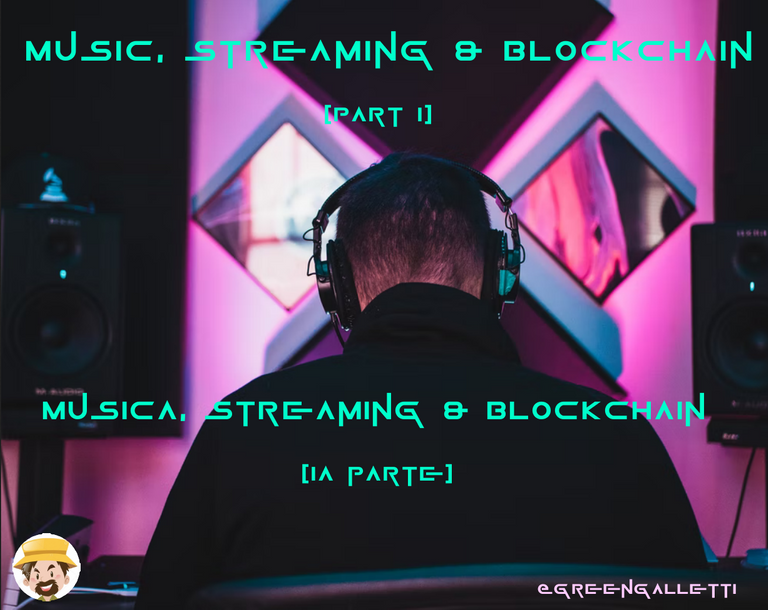
The blockchain, and in popular parlance cryptocurrencies, are spreading across all strata of society and in all economic-social sectors they find compatible with their interests and philosophy.
What began as a simple means of exchanging currencies and operations around the world, eliminating the barriers (and monopolies) of the international financial sector governed first by the dollar and then by the euro, and above all safeguarding the purchasing power of currencies in weak economies subject to the tremendous inflationary blows that have devastated them for decades, has gradually become a relevant factor in the global economy.
The video game industry, of which I have spoken in this and this post, is a clear example, the tokenisation of various aspects of artistic creation and entertainment is another.
Analysing on the table all the social and cultural factors in which the blockchain is having a direct intervention, we realise that the table is missing a leg. To analyse, I understand.
And that aspect which has been little talked about and which is beginning to spread rapidly is music.
Without being a musician by any stretch of the imagination, but a fervent supporter and passionate advocate of good music, I would like to propose a debate on music in this column and on the influence of the blockchain on streaming, for example.
We know, historically, that music artists have always been among the hardest hit by the intervention of the big music majors, i.e. the big record labels that acted as a veritable monopoly, leaving a very small percentage for the artist himself.
I remember many years ago, in my home country, one of the most acclaimed folk groups - the "national" music, so to speak - lamented that they are left with barely 7% of the total value of the record. Of course, the big companies with which they had recorded immediately defended themselves by talking about the costs of promotion, publicity, finance, etc. that they had to bear.
The truth is that the lion's share never went to the artists but to the monopolistic sectors that have always managed the music industry.
How is the blockchain correcting this injustice? Let's take a look and analyse the problem together.
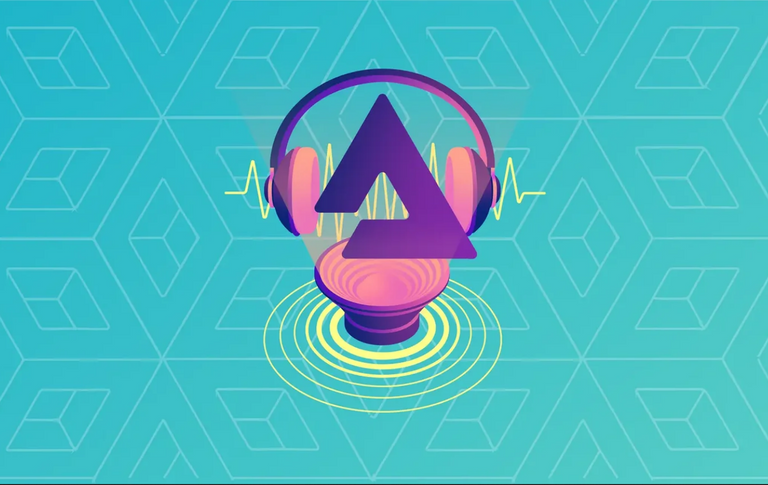
La blockchain, y en el gergo popular las criptomonedas, se están expandiendo por todos los estratos de la sociedad y en todos los sectores económico-sociales que encuentran compatibles con sus intereses y su filosofía.
Lo que comenzó como un simple medio para intercambiar divisas y operaciones en todo el mundo eliminando las barreras (y los monopolios) del sector financiero internacional gobernado por el dólar en primer lugar y por el euro después y sobre todo resguardando el poder adquisitivo de las monedas en economías débiles y sujetas a los tremendos golpes inflacionarios que las han devastado por décadas, se ha transformado de a poco es un factor relevante en la economía mundial.
La industria de los videojuegos de la cuúl les he hablado en este y en este posts son un claro ejemplo, la tokenización de diversos aspectos de la creación artística y del entretenimiento son otro.
Analizando sobre la mesa todos los factores sociales y culturales en los que está teniendo una intervención una intervención directa la blockchain, nos damos cuenta que a la mesa le falta una pata. Por analizar, entiendo.
Y ese aspecto del cuál poco se ha hablado y que comeinza a tomar una rápida difusión es la música.
Sin ser un músico ni mucho menos, pero si ferviente apasionado y defensor de la buena música, es que quiero proponerles un debate sobre la misma en esta oclumna y sobre la injerencia que tiene la blockchain en el streaming, por ejemplo.
Sabemos, históricamente, que los artistas musicales han sido siempre de los más golpeados por la intervención de las grandes "majors" musicales, es decir las grandes casas discográficas que actuaban como un verdadero monopolio dejando un porcentaje muy escaso para el propio artista.
Recuerdo hace muchos años que en mi país de origen uno de los más aclamados conjuntos folklóricos -la música "nacional" por así decirlo- se lamentaba diciendo que le quedan apenas un 7% del valor total del disco. Claro, las grandes compañías en las que habían grabado se defendieron en seguida hablando de los costos de promoción, de publicidad, financieros, etc que debían soportar.
Lo cierto es que la parte del león nunca fue a los artistas sino a los sectores monopólicos que han manejado desde siempre la industria musical.
Cómo está corrigiendo esta injusticia la blockchain? Veamos y analicemos juntos el problema.
NFTs are the element to empower music content creators in the future. / Los NFT son el elemento para empoderar a los creadores de contenido musical en el futuro.
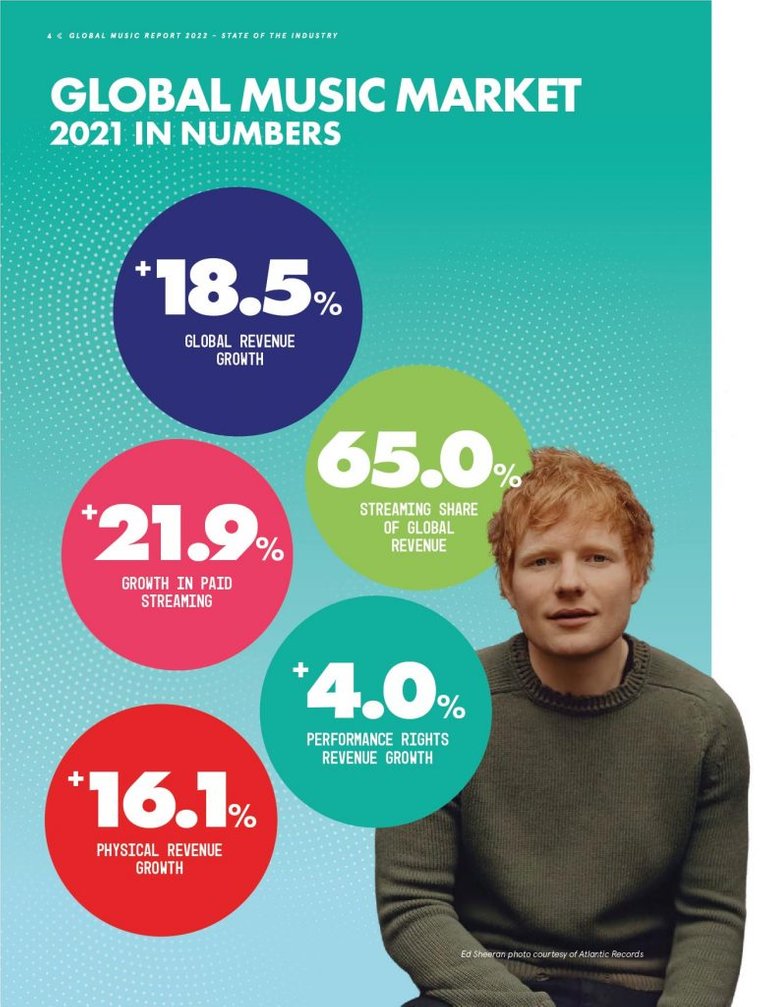
The expansion of the economy - real and virtual - of artistic content creators in general and music content creators in particular has meant that during the coronavirus pandemic, fortunately overcome or at least controlled, NFTs and Web3 have become fundamental tools that allowed - during that period and continuing today - artists and musicians in general to have greater stability and financial control over their own products.
The isolation, preventive or compulsory, depending on the time periods we had to endure in these last two years, made that -among other things- the profits of music streaming, until then hardly relevant, had a significant increase, and from there to the creation of NFT tokens to empower their creativity was only a step away.
Until then the words zoom streaming, virtual classrooms, virtual teaching workshops, virtual concerts through the various streaming channels were unknown and meant a means to survive when theatres, theatres, cinemas and other cultural events were strictly closed.
What at that time was a necessity for survival gradually became an element of artistic-musical independence.
The IFPI - International Federation of the Phonographic Industry - in its traditional annual report called "Global Music Report" revealed that by the end of the pandemic in 2021, revenues in the music sector had reached a record USD 25.9 billion, most of which had been driven by streaming, registering an increase of almost 25% over the previous year, highlighting the demand for audio and video content.
Spotify went from being a simple, second-tier family entertainment platform to being a key element in the mass dissemination of family content. And while Spotify is a centralised platform, it did not take long for this type of content to spread to decentralised NFT markets.
Digital streaming is much faster than print content and allows for quicker action and reaction to changing consumer tastes. A phenomenon that affects not only music but the entire communications sector. Digital media is replacing print media in all sectors of culture, and music could not remain on the sidelines.
In the title of this section I referred to the possibility that artists could be empowered with their tokens.
In this new era of Web3 we are seeing more and more emerging artists minting their own tokens, commercialising them and avoiding the intermediation -with so much profit appropriation- and cession of rights to record labels as was done in the past.
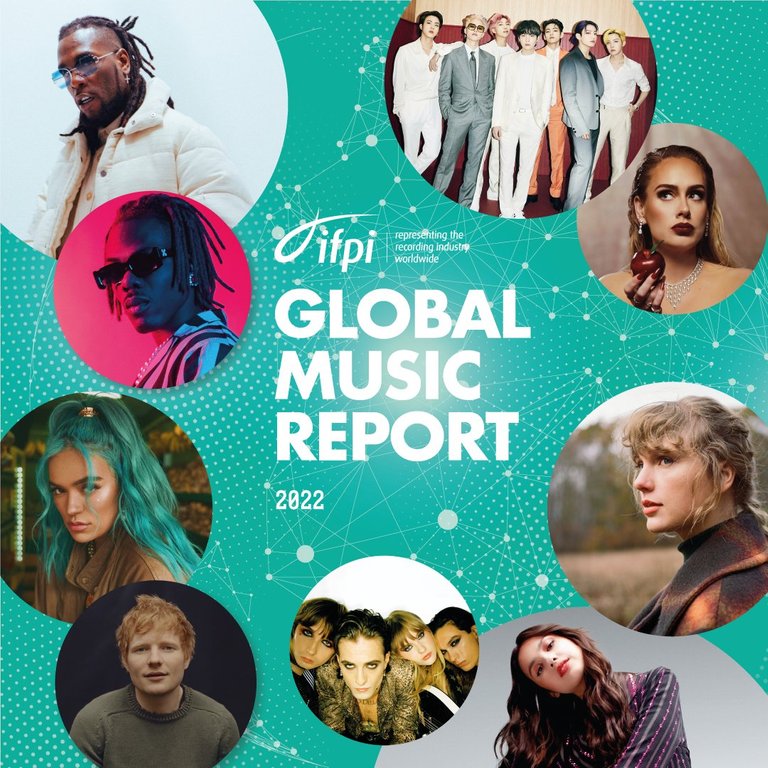
La expansión de la economía -real y virtual- de los creadores de contenidos artísticos en general y musicales en particular ha provocado durante la pandemia del coronavirus, por suerte superada o al menos controlada, que los NFT y Web3 se hayan convirtiendo en herramientas fundamentales que les permitió -durante ese eperíodo y continúa en la actualidad- a los artistas y músicos en general tener una mayor estabilidad y control financiero sobre sus propios productos.
El aislamiento, preventivo u obligatorio, según los períodos temporales que tuvimos que soportar en estos últimos dos años, hizo que -entre otras cosas- las ganancias del streaming de música, hasta ese momento escasamente relevantes, tuvieran un aumento significativo, y de ahí a la creación de los tokens NFT para potenciar su creatividad fue solo un paso.
Hasta ese momento las palabras transmisión por zoom, aulas virtuales, talleres virtuales de enseñanza, conciertos virtuales a través de los distintos canales de streaming eran desconocidas y significaron un medio para sobrevivir cuando las salas de espectáculos, teatros, cines y demás eventos culturales estaban rigurosamente cerradas.
Lo que en ese momento fue una necesidad de sobrevivencia de a poco se transformó en un elemento de independencia artístico-musical.
La IFPI -Federación Internacional de la Industria Fonográfica- en su tradicional informe anual llamado "Informe mundial de la música" reveló que, hacia fines de la pandemia en el año 2021 los ingresos en el sector de la música habían alcanzado la cifra récord de 25.900 millones de USD, de los cuáles la mayor parte había sido impulsada por el streaming, registrando un aumento casi del 25% en relación al año anterior, resaltando la demanda de contenido de audio y video.
Spotify de ser una simple plataforma de entretenimiento familiar de segundo orden pasó a ser un elemento fundamental para la difusión masiva de los contenidos familiares. Y si bien Spotify es una plataforma centralizada este tipo de contenidos no tardó demasiado en expandirse hacia los mercados NFT descentralizados.
La transmisión digital es mucho más rápida que los contenidos impresos y permite actuar y reaccionar más rápidamente ante los cambios en los gustos del consumidor. Un fenómeno que no solo afecta a la música sino a todo el sector de las comunicaciones. Los medios digitales está reemplazando a los medios impresos en todos los sectores de la cultura y la música no podía quedarse al margen.
En el título de este apartado hacía referencia a la posibilidad de que los artistas se pudieran empoderar con sus tokens.
En esta nueva era de la Web3 estamos viendo cada vez más artistas emergentes acuñar su propios tokens, comercializarlos y evitar la intermediación -con tanto de apropiación de ganancias- y cesión de derechos a las casas discográficas como se hacía en el pasado.
Communities as the basis of the system. / Las comunidades como base del sistema.
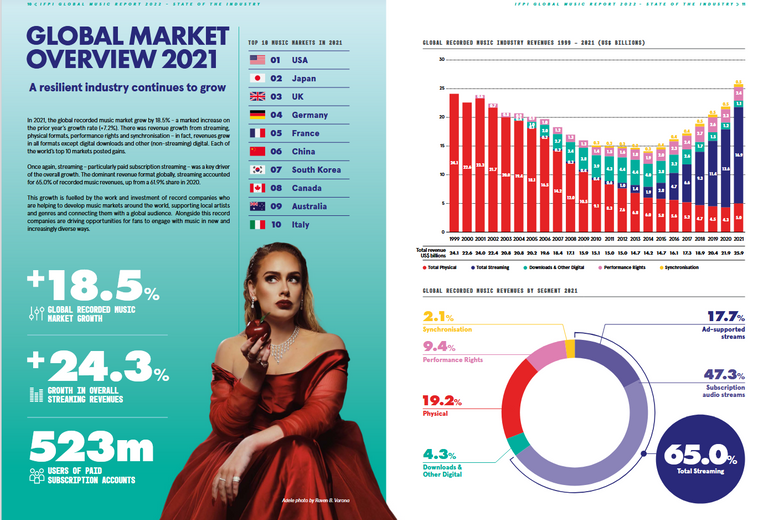
We regularly see how the proliferation of communities is transforming the activity of content platforms.
Trying to identify their sector of belonging, their "brand" as it is common to hear it from many administrators, moderators and content curators, is trying to maximise the dissemination of specific content.
If my contents are sporting, I will try to identify a community where to publish them in order to avoid dispersion in the preferences of users and concentrate my efforts on trying to capture, from that specific position, attention and a point of reference.
If my contents are musical, I will have to act in the same way, identifying a musical community -or at least an artistic culture community where music plays an important role- according to my interests.
These two simple examples justify and explain the dissemination of communities.
The dissemination of NFT projects (in this case music) needs a community (or several communities) to rely on and to help them disseminate the content on a large scale, and for this the artists must rely and rely on their own networks. In other words, to replace the old role that was played by the record labels and for which they sometimes kept more than 90% of the revenues generated, as I explained in the example above.
Their task was to do very little, to invest relatively little money in order to earn huge sums of money.
This also requires artists to take a certain amount of risk and acquire certain knowledge of the market that goes beyond their musical taste, a function that was carried out by real marketing experts in the record companies.
I remember an anecdote in my country before I emigrated to Europe (I'm talking about almost "prehistoric" times, please don't laugh) around the 1990s when the famous "pachanga", "cuartetazos" music, a kind of "cumbia" but very different from the cumbia of Colombia, Cuba or Central America, was in vogue in most of South America. It was popular music that the great strategists of the music labels had discovered that it interested a large part of the population and therefore had to be disseminated because it was big business. Artists (or pseudo-artists) overnight were appearing like mushrooms all hours of the day on radio and TV. And people consumed those products on a massive scale.
It is not the purpose of this post to make a judgement on that kind of music, but to show that artists who intend to tokenise their own musical art must also have that bit of cunning to be able to sell it.
We will talk about the insidiousness of the market and the ways to avoid it in a future post.
Until next time #hivers friends of this music community!

Vemos habitualmente como la proliferación de comunidades está transformando la actividad de las plataformas de contenidos.
Tratar de identificar su sector de pertenencia, su "marca" como es habitual escucharlo en muchos administradores, moderadores y curadores de contenido, es tratar de maximizar la difusión de un contenido específico.
Si mis contenidos son deportivos trataré de indentificar una comunidad donde publicarlos para evitar la dispersión en las preferencias de los usuarios y concentrar mis esfuerzos en tratar de captar, desde esa posición específica, la atención y un punto de referencia.
Si mis contenidos son musicales deberé actuar de la misma manera, identificando una comunidad musical -o al menos de cultura artística donde la música tenga un rol importante- acorde a mis intereses.
Estos dos simples ejemplos justifican y explican la difusión de las comunidades.
La difusión de los proyectos NFT (en este caso musicales) necesitan una comunidad (o varias comunidades) en la cuál apoyarse y que les ayude a difundir el contenido a gran escala y para ello los artistas deben confiar y apoyarse en su propias redes. Es decir substituir ese viejo rol que estaba a cargo de los sellos discográficos y para lo cuúl se quedaban a veces con más del 90% de los ingresos generados, como explicaba en el ejemplo de párrafos anteriores.
Su tarea consistía en hacer muy poco, invertir relativamente poco dinero para ganar sumas cuantiosas del mismo. un gran negocio, un gigantesco "business" que, al menos en ese aspecto, está llegando a su fin.
Esto requiere también por parte de los artistas asumirse un cierto riesgo y adquirir ciertos conocimientos del mercado que van más allá de su gusto musical, función que estaba a cargo en las casas discográficas de verdaderos expertos del marketing.
Recuerdo una anécdota en mi país antes de emigrar a Europa (estoy hablando de épocas casi "prehistóricas", por favor no se rían) alrededor de los años noventa cuando estaba de moda en gran parte de Sudamérica la famosa "pachanga", música de "cuartetazos" una especie de "cumbia" pero muy distinta de la cumbia dolombiana, cubana o de Centro América. Era música popular que los grandes estrategas de los sellos musicales habían descubierto que interesaba a gran parte de la población y por lo tanto tenía que ser difundida porque era un gran negocio. Artistas (o pseudo artistas) de la noche a la mañana aparecían como hongos a todas las horas del día en radio y TV. Y la gente consumía esos productos en forma masiva.
No es el objeto de este post hacer un juicio sobre ese tipo de música, pero si dmeostrar que lso artistas que pretenden tokenizar su propia arte musical deberán también tener ese mínima de astucia para poder venderla.
De las insidias que les ofrece el mercado y los modos para evitarlas hablaremos en un próximo post.
Hasta la próxima amigos #hivers de esta comunidad musical!

The lower part of the signature banner corresponds to the badget made by the @hivebuzz team. My thanks to them and in particular to @arcange.
La parte inferior del banner de la firma corresponde al badget elaborado por el equipo de @hivebuzz. Mi agradecimiento a ellos y en particular a @arcange.
https://twitter.com/HugoRep/status/1510991214702743568
The rewards earned on this comment will go directly to the person sharing the post on Twitter as long as they are registered with @poshtoken. Sign up at https://hiveposh.com.
Your post has been manually curated by the Stick Up Boys Curation team!
Because we love your content we've upvoted and reblogged it!
Keep on creating great quality content and !1UP to you!
Follow @stickupcurator for great music and art content!

Have some !PIZZA because...
You have received a 1UP from @stickupcurator!
@ccc-curator, @beatcz-curator, @vyb-curator, @pob-curator, @neoxag-curator, @pal-curatorAnd they will bring !PIZZA 🍕
Learn more about our delegation service to earn daily rewards. Join the family on Discord.
PIZZA Holders sent $PIZZA tips in this post's comments:
@stickupcurator(2/10) tipped @greengalletti (x1)
Please vote for pizza.witness!
Blockchain and Web3 is definitely a great tool for musical artists for sure. I'm a DJ myself and I had issues with Youtube blocking part of my DJ sets for copyright. Centralized media services can and will censor your art.